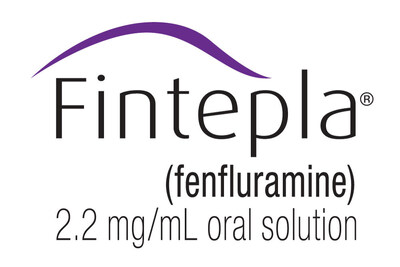Final analysis of open-label extension (OLE) study of FINTEPLA® (fenfluramine) in Lennox-Gastaut syndrome published in Epilepsy & Behavior
- FINTEPLA is approved by the U.S. Food and Drug Administration (FDA) for the treatment of seizures associated with Dravet syndrome (DS) and Lennox-Gastaut syndrome (LGS) in patients two years of age and older1
- No new safety signals were reported, reinforcing the consistent safety profile seen in previous studies2
- Long-term data on the treatment of seizures in children and adults living with Lennox-Gastaut syndrome (LGS) with fenfluramine demonstrated sustained reduction in frequency of seizures associated with a fall and improvement in global functioning2
- Additionally, parents/caregivers reported improvements in overall quality of life and a reduction in levels of their own anxiety from baseline through month 12 of the OLE period2
ATLANTA, Oct. 14, 2025 /PRNewswire/ -- UCB, a global biopharmaceutical company, today announced that the final analysis of an open-label extension (OLE) study with the objective to describe long-term safety and effectiveness of FINTEPLA (fenfluramine) in Lennox-Gastaut syndrome (LGS) was published in Epilepsy & Behavior.2 No new or unexpected treatment-emergent adverse events (TEAEs) were reported.2 Children and adults aged 2-35 years treated with fenfluramine showed a significant sustained reduction in frequency of seizures associated with a fall (drop seizures) from Month 2 of OLE to end of study compared with baseline and an improvement in global functioning reported by caregivers and investigators. Parents/caregivers reported improvements in social interactions and activities, feelings of stigma, general health, quality of life, and their own anxiety.2 These results follow final analysis of OLE study evaluating safety and effectiveness of fenfluramine in Dravet syndrome earlier this year, showing long-term tolerability and sustained reduction in monthly convulsive seizure frequency.3
Kelly G Knupp, Associate Professor of Pediatrics and Neurology at the CU Anschutz School of Medicine and coauthor of the paper, said, "These data reinforce the long-term safety and tolerability of fenfluramine in children and adults living with Lennox-Gastaut syndrome, a condition with a significant unmet medical need. The sustained reduction in seizure frequency, coupled with the reported improvements in quality of life for both patients and their families, underscores the importance of addressing not just the clinical but also the emotional and social challenges faced by these families every day."
Highlights from the OLE
247 patients (mean age 14.3±7.6 years) were enrolled from study sites in North America, Europe, and Australia, with a median fenfluramine exposure of 364 days (range: 19–537) and a mean daily dose of 0.4±0.1 mg/kg/day (n=246). Meaningful improvements were seen across the key study endpoints listed below:2
- Common treatment-emergent adverse events (TEAEs) reported in ≥10% of patients included decreased appetite, fatigue, nasopharyngitis, seizures, and pyrexia, with no cases of valvular heart disease or pulmonary arterial hypertension observed. 5.3% of patients discontinued the study due to TEAEs.
- A significant median percentage change in the frequency of seizures associated with a fall from Month 2 to the end of the study (−31.1%, P<0.0001, n=240, modified intent-to-treat (mITT) population), with reductions of −27.6% in pediatric patients (n=170, P=0.0005) and −40.0% in adults (n=70, P<0.0001).
- At the last visit, parents/caregivers and investigators reported an improvement in 59.9% (n=142/237) and 57.0% (n=135) of patients, respectively, on the Clinical Global Impression–Improvement (CGI-I) scale.
- The Quality of Life in Childhood Epilepsy Questionnaire (QOLCE) was completed by parents/caregivers at pre-RCT baseline and at Month 12 of the OLE. From baseline through Month 12 of the OLE period, the mean change in the overall QoL score, calculated as the average of 16 subscale scores, was 2.9 points (n=148, P=0.0166), indicating improvement.
- A limitation of this study was its open-label design. Additionally, bias could be suggested in the effectiveness data due to 23.1% of patients withdrawing for lack of efficacy. The COVID-19 pandemic impacted study duration, causing delays in data capture.
About Lennox-Gastaut syndrome (LGS)
Lennox-Gastaut syndrome (LGS) is a rare, severe developmental and epileptic encephalopathy (DEE) characterized by the presence of tonic seizures and at least one additional seizure type and severe developmental delays.4 It typically starts during childhood and persists into adulthood.4,5 Approximately 50% of infants with a severe DEE evolve over time to be diagnosed with LGS.5 LGS has far-reaching effects beyond seizures; impairments with developmental delay culminating in challenges with cognition, communication, psychiatric symptoms, sleep, behavior, and mobility are common.5 Seizures largely remain drug-resistant into adulthood on currently available medications.5,6 Sudden unexpected death in epilepsy (SUDEP) is a major concern for patients and families with LGS.7
About FINTEPLA
Important Safety Information about FINTEPLA® (fenfluramine) in the US
INDICATIONS AND USAGE
FINTEPLA is indicated for the treatment of seizures associated with Dravet syndrome (DS) and Lennox-Gastaut syndrome (LGS) in patients 2 years of age and older.
IMPORTANT SAFETY INFORMATION
BOXED WARNING: VALVULAR HEART DISEASE and PULMONARY ARTERIAL HYPERTENSION
- FINTEPLA can cause valvular heart disease and pulmonary arterial hypertension.
- Echocardiogram assessments are required before, during, and after treatment with FINTEPLA.
- FINTEPLA is available only through a restricted program called the FINTEPLA REMS.
CONTRAINDICATIONS
FINTEPLA is contraindicated in patients with hypersensitivity to fenfluramine or any of the excipients in FINTEPLA and with concomitant use, or within 14 days of the administration, of monoamine oxidase inhibitors because of an increased risk of serotonin syndrome.
WARNINGS AND PRECAUTIONS
Valvular Heart Disease and Pulmonary Arterial Hypertension (see Boxed Warning): FINTEPLA can cause valvular heart disease (VHD) and pulmonary arterial hypertension (PAH). Although no patients receiving FINTEPLA developed VHD or PAH in clinical trials for DS and LGS of up to 3 years in duration, cases of VHD and PAH have been reported during use of FINTEPLA in the postmarketing setting. Because of this risk, cardiac monitoring is required prior to starting treatment, during treatment, and after treatment with FINTEPLA concludes. Cardiac monitoring via echocardiogram can identify evidence of VHD and PAH prior to a patient becoming symptomatic, aiding in early detection of these conditions.
Monitoring: Prior to starting treatment, patients must undergo an echocardiogram to evaluate for VHD and PAH. Echocardiograms should be repeated every 6 months, and once 3-6 months post treatment with FINTEPLA.
The prescriber must consider the benefits versus the risks of initiating or continuing treatment with FINTEPLA if any of the following signs are observed via echocardiogram: valvular abnormality or new abnormality; VHD indicated by mild or greater aortic regurgitation or moderate or greater mitral regurgitation, with additional characteristics of VHD (e.g., valve thickening or restrictive valve motion); PAH indicated by elevated right heart/pulmonary artery pressure (PASP >35 mm Hg).
FINTEPLA REMS (see Boxed Warning): FINTEPLA is available only through a restricted distribution program called the FINTEPLA Risk Evaluation and Mitigation Strategy (REMS). Prescribers must be certified by enrolling in the FINTEPLA REMS. Prescribers must counsel patients receiving FINTEPLA about the risk of VHD and PAH, how to recognize signs and symptoms of VHD and PAH, the need for baseline (pretreatment) and periodic cardiac monitoring via echocardiogram during FINTEPLA treatment, and cardiac monitoring after FINTEPLA treatment.
Decreased Appetite and Decreased Weight: FINTEPLA can cause decreases in appetite and weight. Decreases in weight appear to be dose related. Weight should be monitored regularly during treatment with FINTEPLA, and dose modifications should be considered if a decrease in weight is observed.
Somnolence, Sedation, and Lethargy: FINTEPLA can cause somnolence, sedation, and lethargy. Other central nervous system depressants, including alcohol, could potentiate these effects of FINTEPLA. Prescribers should monitor patients for somnolence and sedation and should advise patients not to drive or operate machinery until they have gained sufficient experience on FINTEPLA to gauge whether it adversely affects their ability to drive or operate machinery.
Suicidal Behavior and Ideation: Antiepileptic drugs (AEDs), including FINTEPLA, increase the risk of suicidal thoughts or behaviors in patients taking these drugs for any indication. Patients treated with an AED for any indication should be monitored for the emergence or worsening of depression, suicidal thoughts or behaviors, or any unusual changes in mood or behavior.
Withdrawal of Antiepileptic Drugs: As with most AEDs, FINTEPLA should generally be withdrawn gradually because of the risk of increased seizure frequency and status epilepticus. If withdrawal is needed because of a serious adverse reaction, rapid discontinuation can be considered.
Serotonin Syndrome: Serotonin syndrome, a potentially life-threatening condition, may occur with FINTEPLA, particularly during concomitant administration of FINTEPLA with other serotonergic drugs, including, but not limited to, selective serotonin-norepinephrine reuptake inhibitors (SNRIs), selective serotonin reuptake inhibitors (SSRIs), tricyclic antidepressants (TCAs), bupropion, triptans, dietary supplements (e.g., St. John's Wort, tryptophan), drugs that impair metabolism of serotonin (including monoamine oxidase inhibitors [MAOIs], which are contraindicated with FINTEPLA), dextromethorphan, lithium, tramadol, and antipsychotics with serotonergic agonist activity. Patients should be monitored for the emergence of signs and symptoms of serotonin syndrome, which include mental status changes, autonomic instability, neuromuscular signs, and/or gastrointestinal symptoms. If serotonin syndrome is suspected, treatment with FINTEPLA should be stopped immediately and symptomatic treatment should be started.
Increase in Blood Pressure: FINTEPLA can cause an increase in blood pressure. Rare cases of significant elevation in blood pressure, including hypertensive crisis, have been reported in adult patients treated with fenfluramine, including patients without a history of hypertension. In clinical trials for DS and LGS of up to 3 years in duration, no pediatric or adult patient receiving FINTEPLA developed hypertensive crisis. Monitor blood pressure in patients treated with FINTEPLA.
Glaucoma: Fenfluramine can cause mydriasis and can precipitate angle closure glaucoma. Consider discontinuing treatment with FINTEPLA in patients with acute decreases in visual acuity or ocular pain.
ADVERSE REACTIONS
The most common adverse reactions observed in DS studies (incidence at least 10% and greater than placebo) were decreased appetite; somnolence, sedation, lethargy; diarrhea; constipation; abnormal echocardiogram; fatigue, malaise, asthenia; ataxia, balance disorder, gait disturbance; blood pressure increased; drooling, salivary hypersecretion; pyrexia; upper respiratory tract infection; vomiting; decreased weight; fall; status epilepticus.
The most common adverse reactions observed in the LGS study (incidence at least 10% and greater than placebo) were diarrhea; decreased appetite; fatigue; somnolence; vomiting.
To report SUSPECTED ADVERSE REACTIONS, contact UCB, Inc. at 1-844-599-2273 or FDA at 1-800-FDA-1088 or www.fda.gov/medwatch.
Please see full Prescribing Information, including Boxed Warning and Medication Guide, for additional Important Safety Information on FINTEPLA.
For further information, contact UCB:
Investor Relations
Antje Witte
T: +32.2.559.94.14
email antje.witte@ucb.com
US Communications
Becky Malone
T +1.919.605.9600
Email becky.malone@ucb.com
About UCB
UCB, Brussels, Belgium (www.ucb.com) is a global biopharmaceutical company focused on the discovery and development of innovative medicines and solutions to transform the lives of people living with severe diseases of the immune system or of the central nervous system. With approximately 9,000 people in approximately 40 countries, the company generated revenue of €5.3 billion in 2023. UCB is listed on Euronext Brussels (symbol: UCB). Follow us on Twitter: @UCBUSA.
About Epilepsy
Epilepsy is a common neurological condition worldwide and affects approximately 50 million people. Epilepsy can develop in any person at any age and is usually diagnosed after a person has had at least two seizures (or after one seizure with a high risk for more) that were not caused by some known medical condition.
About UCB in Epilepsy
For three decades we've been committed to people living with epilepsy and their families, surrounding the patient and caregiver through every step of their care journey. At our core we have a responsibility to elevate the healthcare ecosystem. Because of this, we have established our legitimacy on the front lines of epilepsy research, development, and treatment innovation. But our past breakthroughs are only a prologue to our future. We will continue to reimagine how we care for patients, leveraging today's expertise for a better tomorrow. With so much experience behind us and so much potential ahead, we are more invested than ever in profoundly improving the lives of those living with or caring for those with epilepsy or a rare epilepsy syndrome – through our relentless pursuit of a seizure-free life.
Forward looking statements
This press release may contain forward-looking statements including, without limitation, statements containing the words "believes", "anticipates", "expects", "intends", "plans", "seeks", "estimates", "may", "will", "continue" and similar expressions. These forward-looking statements are based on current plans, estimates and beliefs of management. All statements, other than statements of historical facts, are statements that could be deemed forward-looking statements, including estimates of revenues, operating margins, capital expenditures, cash, other financial information, expected legal, arbitration, political, regulatory or clinical results or practices and other such estimates and results. By their nature, such forward-looking statements are not guarantees of future performance and are subject to known and unknown risks, uncertainties and assumptions which might cause the actual results, financial condition, performance or achievements of UCB, or industry results, to differ materially from those that may be expressed or implied by such forward-looking statements contained in this press release. Important factors that could result in such differences include: changes in general economic, business and competitive conditions, the inability to obtain necessary regulatory approvals or to obtain them on acceptable terms or within expected timing, costs associated with research and development, changes in the prospects for products in the pipeline or under development by UCB, effects of future judicial decisions or governmental investigations, safety, quality, data integrity or manufacturing issues; potential or actual data security and data privacy breaches, or disruptions of our information technology systems, product liability claims, challenges to patent protection for products or product candidates, competition from other products including biosimilars, changes in laws or regulations, exchange rate fluctuations, changes or uncertainties in tax laws or the administration of such laws, and hiring and retention of its employees. There is no guarantee that new product candidates will be discovered or identified in the pipeline, will progress to product approval or that new indications for existing products will be developed and approved. Movement from concept to commercial product is uncertain; preclinical results do not guarantee safety and efficacy of product candidates in humans. So far, the complexity of the human body cannot be reproduced in computer models, cell culture systems or animal models. The length of the timing to complete clinical trials and to get regulatory approval for product marketing has varied in the past and UCB expects similar unpredictability going forward. Products or potential products, which are the subject of partnerships, joint ventures or licensing collaborations may be subject to differences disputes between the partners or may prove to be not as safe, effective or commercially successful as UCB may have believed at the start of such partnership. UCB's efforts to acquire other products or companies and to integrate the operations of such acquired companies may not be as successful as UCB may have believed at the moment of acquisition. Also, UCB or others could discover safety, side effects or manufacturing problems with its products and/or devices after they are marketed. The discovery of significant problems with a product similar to one of UCB's products that implicate an entire class of products may have a material adverse effect on sales of the entire class of affected products. Moreover, sales may be impacted by international and domestic trends toward managed care and health care cost containment, including pricing pressure, political and public scrutiny, customer and prescriber patterns or practices, and the reimbursement policies imposed by third-party payers as well as legislation affecting biopharmaceutical pricing and reimbursement activities and outcomes. Finally, a breakdown, cyberattack or information security breach could compromise the confidentiality, integrity and availability of UCB's data and systems.
Given these uncertainties, you should not place undue reliance on any of such forward-looking statements. There can be no guarantee that the investigational or approved products described in this press release will be submitted or approved for sale or for any additional indications or labelling in any market, or at any particular time, nor can there be any guarantee that such products will be or will continue to be commercially successful in the future.
UCB is providing this information, including forward-looking statements, only as of the date of this press release. UCB expressly disclaims any duty to update any information contained in this press release, either to confirm the actual results or to report or reflect any change in its forward-looking statements with regard thereto or any change in events, conditions or circumstances on which any such statement is based, unless such statement is required pursuant to applicable laws and regulations.
Additionally, information contained in this document shall not constitute an offer to sell or the solicitation of an offer to buy any securities, nor shall there be any offer, solicitation or sale of securities in any jurisdiction in which such offer, solicitation or sale would be unlawful prior to the registration or qualification under the securities laws of such jurisdiction.
References
FINTEPLA® is a registered trademark of the UCB Group of Companies.
©2025 UCB, Inc., Smyrna, GA 30080. All rights reserved.
US-FA-2500674
![]() View original content to download multimedia:https://www.prnewswire.com/news-releases/final-analysis-of-open-label-extension-ole-study-of-fintepla-fenfluramine-in-lennox-gastaut-syndrome-published-in-epilepsy--behavior-302583331.html
View original content to download multimedia:https://www.prnewswire.com/news-releases/final-analysis-of-open-label-extension-ole-study-of-fintepla-fenfluramine-in-lennox-gastaut-syndrome-published-in-epilepsy--behavior-302583331.html
SOURCE UCB



